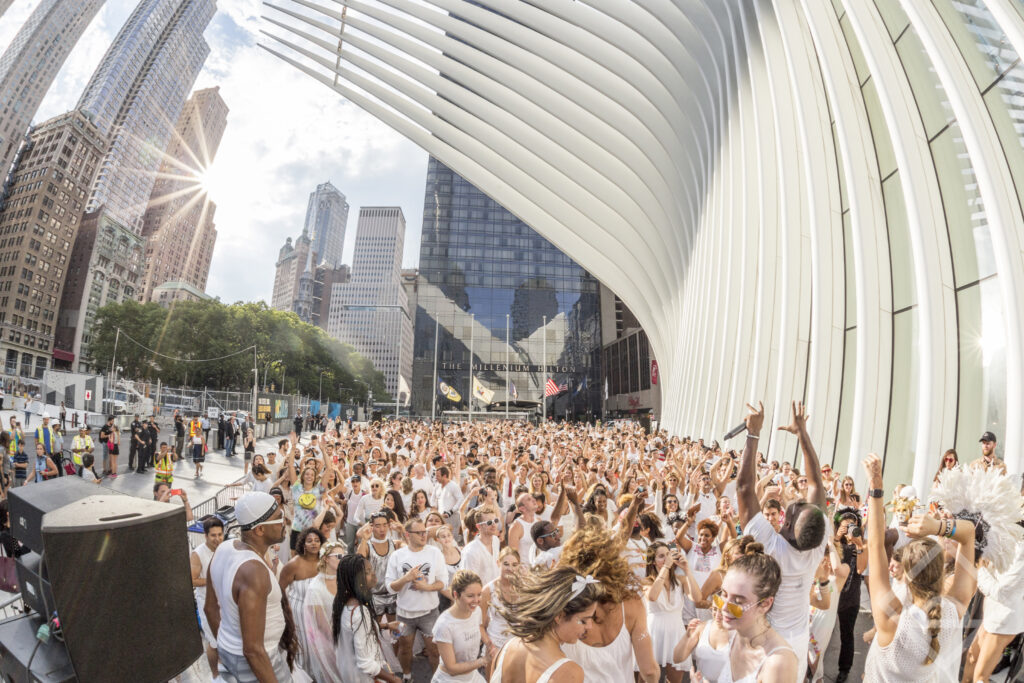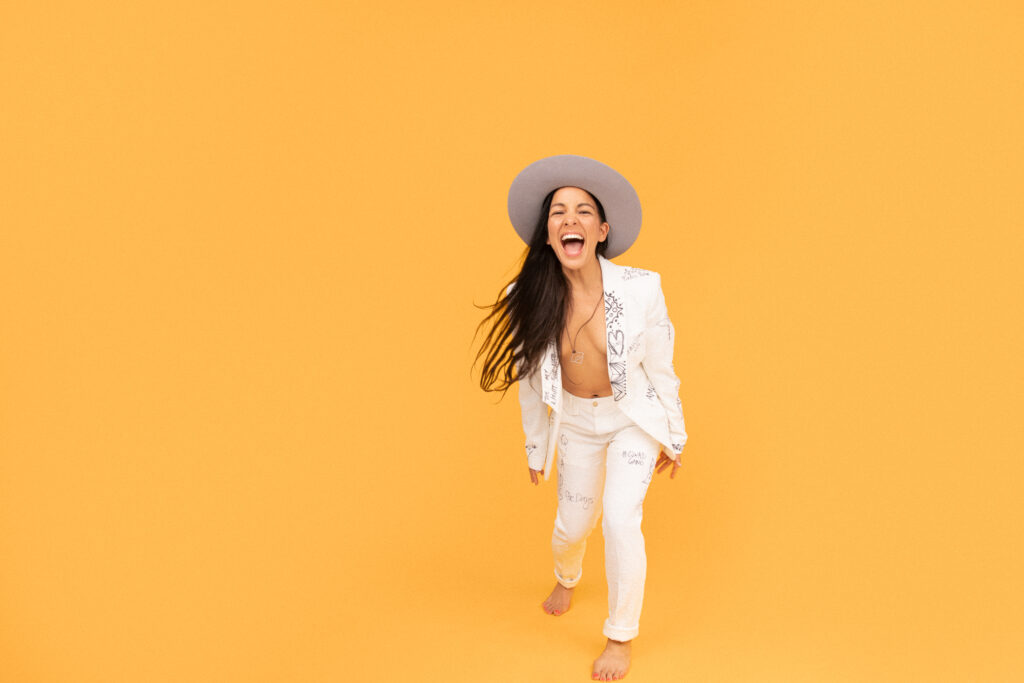
Late one night on a Brooklyn curbside, Radha Agrawal dreamed up Daybreaker—a sober dance event that starts at 6 AM and ends at 9 AM—and reinvented nightlife forever. PETER DAVIS sets his alarm for dawn and discovers that Daybreaker is becoming much more than just a dance party.
It’s just before 7 AM on a quiet, hazy Tuesday morning in Midtown Manhattan. The streets are almost empty, save for a food-cart vendor and a few delivery guys. But as the city slowly opens its eyes, Rockefeller Center could not be more awake. On a stage two DJs spin house music in front of the iconic 18-foot gold statue of the Greek Titan Prometheus, who is most known for going against the gods and providing fire to humanity. Hundreds of bodies gyrate and sway as if in a collective trance. Outfits range from ruffled layers of rainbow chiffon to glittering gold-sequin shorts to all-white from head to toe. With headphones strapped over their ears, the throng dances, arms reaching up to the sky. On the sidewalk above, passersby gawk in curiosity and confusion. What looks like a flash mob is in fact Daybreaker—the sober dance movement founded by Radha Agrawal that has disrupted and reinvented nightlife. Daybreaker’s early-morning parties have a following of 800,000-plus people and have traveled to over 33 cities around the globe.
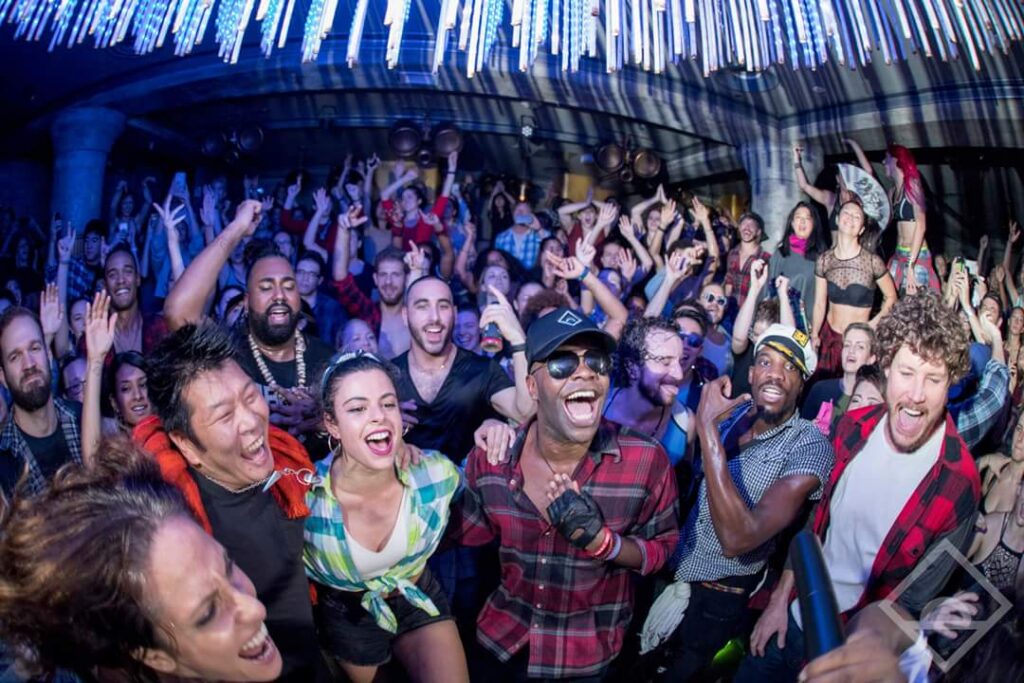
“Love yourself,” commands MC Elliott LaRue into a microphone as a sped-up version of Jefferson Airplane’s“Somebody to Love” plays. With oversized dark sunglasses and a black scarf framing his strong features, LaRue looks like Grace Jones playing Joel Grey in Cabaret—he keeps the party going. Agrawal met LaRue when he came to the second Daybreaker. Six months later, LaRue, who is a musical artist, took the microphone and started freestyle rapping. The crowd went wild. “If you’re going to have a cultural impact, hip hop has to be a part of it because hip hop is the voice of this generation,” says LaRue. “It’s the new rock and roll.”
As LaRue freestyles, a drummer beats rapidly while a horn section wiggles through the pulsating crowd like a street parade in New Orleans. Just off stage, two eight-year-old boys jump up and down with glee. Nearby, a bearded man wearing a pink tutu turns like a whirling dervish, creating the illusion of spinning cotton candy. The energy is frenetic. No one is standing still. “I’ve been to over 100 Daybreakers,” a 50-something woman in a purple tie-dye bikini and feather headdress tells me. “It’s changed my life. I leave happier and more connected to people. I am totally addicted to the feeling I get from these events.” “This is a movement,” LaRue says. “This is an opportunity to shift minds. I want to help people see life in a way that helps them live it, rather than being afraid or angry.”
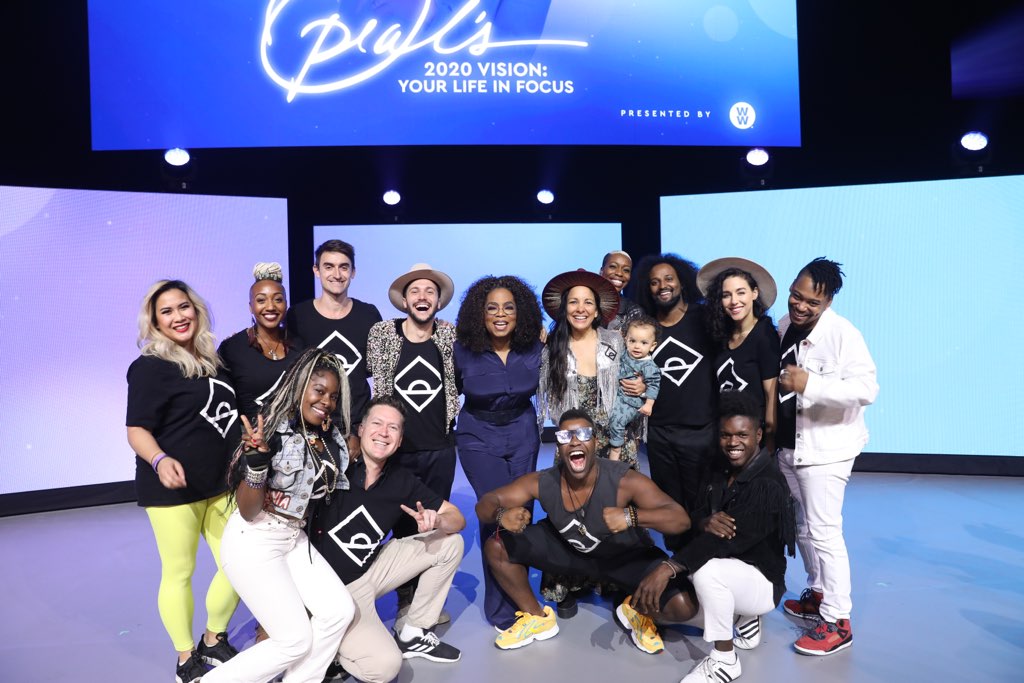
A few days later, the core Daybreaker team—founder and CEO, Radha Agrawal; her husband, Eli Clark-Davis (and their young daughter, aptly named Solei); and COO, Timothy Patch—bring their dance movement to Othership, which just opened in the Flatiron District. An immersive, ultra-designed high-tech sauna that fits 64 people and a long, cavernous room of ice baths, Othership was started in Toronto in 2022 by Robbie Bent. Calling itself a “house of transformation,” Othership is far from an ordinary wellness spa. “We invested in Othership, which is something we never really do,” Agrawal, sporting a red bathing suit with lace insets, tells me. We are standing by a table with rows of green juice shots and all-natural energy drinks and piles of tangerines and bananas; Daybreaker is 100 percent alcohol-free. “It was the right fit for Daybreaker. It’s magical to be opening Othership’s first New York location—they are at the forefront of community wellness and an extension of what we do.”
The sauna soon fills up. Lights beam, blink, and bounce to the rhythm of Gotye’s “Somebody That I Used to Know.” Jacob, a strapping Othership “guide,” wears a conical felt hat and leads yoga-style breathing and stretching exercises. With ceremonial vigor, he hurls a cedar-infused snowball onto the hot coals, flooding the room with a woodsy scent. Next up: ice bath plunges into 32-degree water for two minutes. Brrr!
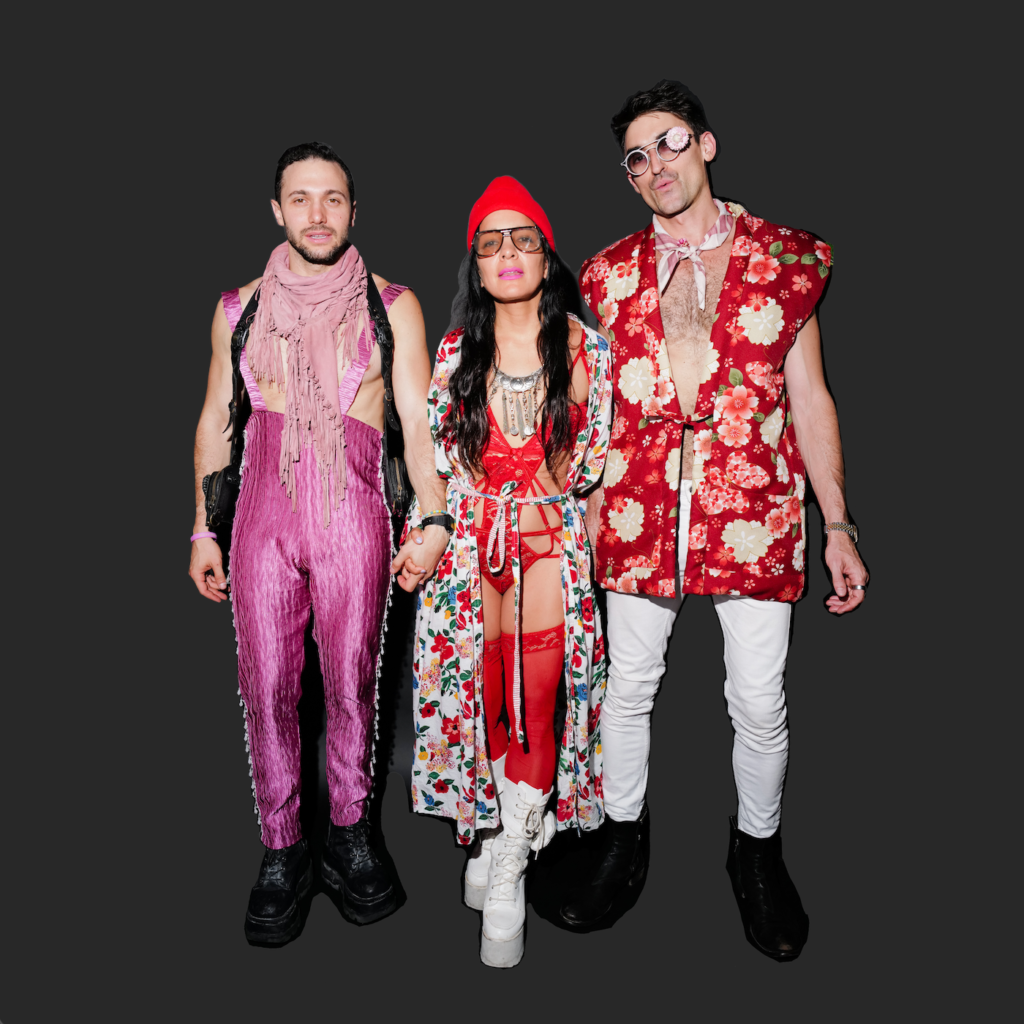
Daybreaker co-founders Eli Clark-Davis, Radha Agrawal and Timothy Patch
Invigorated and fully awake, everyone files into the lounge where a DJ has started spinning in front of a white fabric wall piece that looks like a moving cloud. LaRue asks the crowd to throw their arms up and yell with joy. The room vibrates with dozens of voices and a frenzy of dancing. Normally Daybreaker commences with an hour of yoga before the dance party, but the Othership sauna/ice bath is a special exception.
“After yoga, the dance floor is warmed up,” explains Agrawal, who choreographs the Daybreaker run-of-show like science. “It’s the perfect way to wake up the body before we dance.” Two hours of nonstop dancing later, the moshed mass, all in bathing suits, drips with sweat. Daybreaker’s anthem, “Open Your Eyes,” fills the room. Almost every single person knows the lyrics, singing in unison: “Open your eyes as you dance with a smile on your face / As we rise, rise and shine in the morning.” The event closes with a poem by Rumi (“The breeze at dawn has secrets to tell you. Don’t go back to sleep”) before people are asked to find a new friend and hold their hands, looking into their eyes to make a silent, but strong, human connection. “Bring this energy. This joy. Bring it out to the world today,” Agrawal tells the crowd.
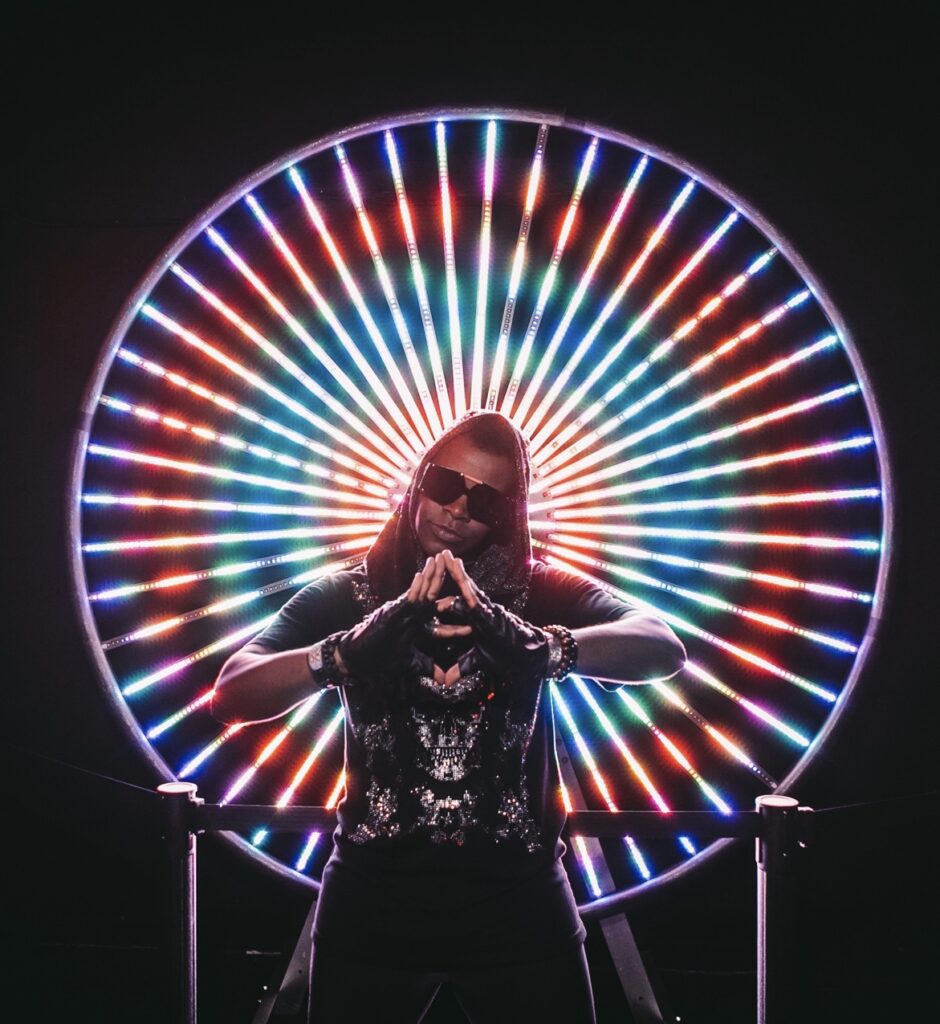
Later in the week, I meet Agrawal at the Daybreaker headquarters in Greenpoint, Brooklyn. Tapestry rugs cover hardwood floors. The air smells citrusy, like one of the fragrant ice balls tossed onto the coals at Othership. Agrawal was born in Montreal and is half Indian and half Japanese. She is petite and pretty and smiles easily and broadly; her chocolate-brown eyes are kind and inviting. Wearing a large-brimmed cherry-red bolero-style hat and platform boots, she plops down on a big cushion. Nearby, her husband taps away on a laptop. “Daybreaker came to me from the concept of breaking the day with love, intention, and energy,” Agrawal begins.
One night over a decade ago, she was out late in Williamsburg, Brooklyn, with friend Matthew Brimer. They had just left a loud, rowdy nightclub. “I was slightly hungover, eating falafels,” she remembers, rolling her eyes. “I’m like, what the hell are we doing? I was 33 at the time and done with spilled drinks and mean bouncers. We thought: what if we reinvented the social hour? What if we throw dance parties before going to work? What if we replace mean bouncers with a hugging committee? What if we replace alcohol with green juice?”
A natural entrepreneur (Agrawal founded the female-centric brand Thinx with her twin sister, Miki, and Antonia Dunbar), she and Brimer decided to try out the idea as a social experiment. The first Daybreaker took place at Coffee Shop, the since-shuttered restaurant on Union Square. It was the first big snowfall of December. “No one is going to show up here at 6 AM,” Agrawal thought that morning. But 180 of her friends turned up. At the second Daybreaker, it was 300 people, then 500 at the third one. “It was such a vibe,” she remembers with a wide smile. “Everyone started spreading the word. We didn’t advertise or do any marketing. I call it whisper-sharing.”
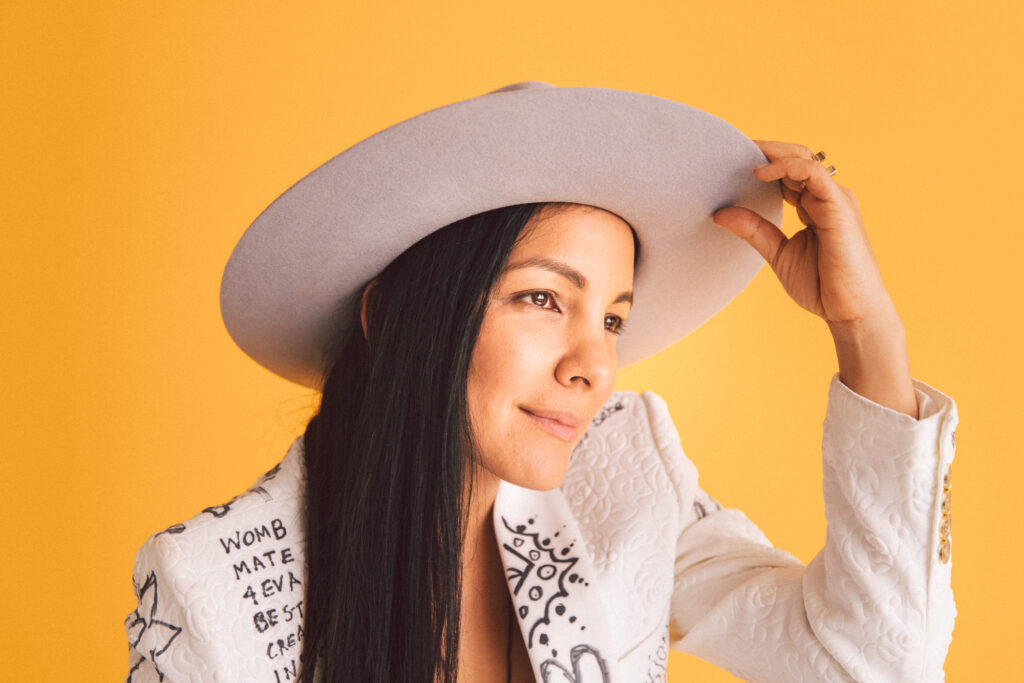
Radha Agrawal
Daybreakers on the Santa Monica Pier; at the Smithsonian American Art Museum in Washington, DC; in the dinosaur room of New York’s American Museum of Natural History; and on the Hiyu ferry in Seattle followed. From there, Daybreaker went global—London, Paris, São Paulo. Agrawal has taken her dance party movement to the pyramids in Giza, the Serengeti during the Great Migration, and Antarctica on the ice floats with penguins. “We raised millions of dollars for climate change with those three trips,” she reports.
Daybreaker’s global popularity is thanks to Agrawal’s vision of breaking people’s codependence between having fun and being intoxicated or on drugs. “The idea was: how can we come home to our own natural neurochemicals? You dose yourself on your own natural high, your dopamine, your serotonin, your endorphins—a whole new frontier of socialization around sober socializing. Dressing up and the fun, mystique, and mischief of nightlife, but in the daytime. The energy is clean, fresh, and substance-free.” Agrawal deep-dove into the myriad health benefits of dance and IRL human connection. “Psychologically, dance is the most healing technology and it’s anti-aging,” she explains. “Collective dance supports your mitochondria. It helps you get younger. You feel that joy of youth and music. We did a seven-day Daybreaker one year. At the end of the week, I had danced 20 miles. I had never felt better and I’m in the best shape of my life.”
Agrawal is equally fascinated by the psychological benefits of community building—and the human connection that comes with communal dancing. She envisions the Daybreaker movement as alternative medicine to the psycho-pharmaceutical drugs doctors dole out like Tic Tacs to people suffering with depression and anxiety. “We’re doing a study right now with UC Berkeley and the Greater Good Science Center,” she says. “It’s a first of its kind—we’re studying collective effervescence. What happens to your happiness before and after you dance in a collective experience? Our goal for this study is for doctors to prescribe collective dance as an antidote to depression, anxiety, loneliness, and isolation. Ninety percent of depression cases are from loneliness. Daybreaker is about getting people back together.”
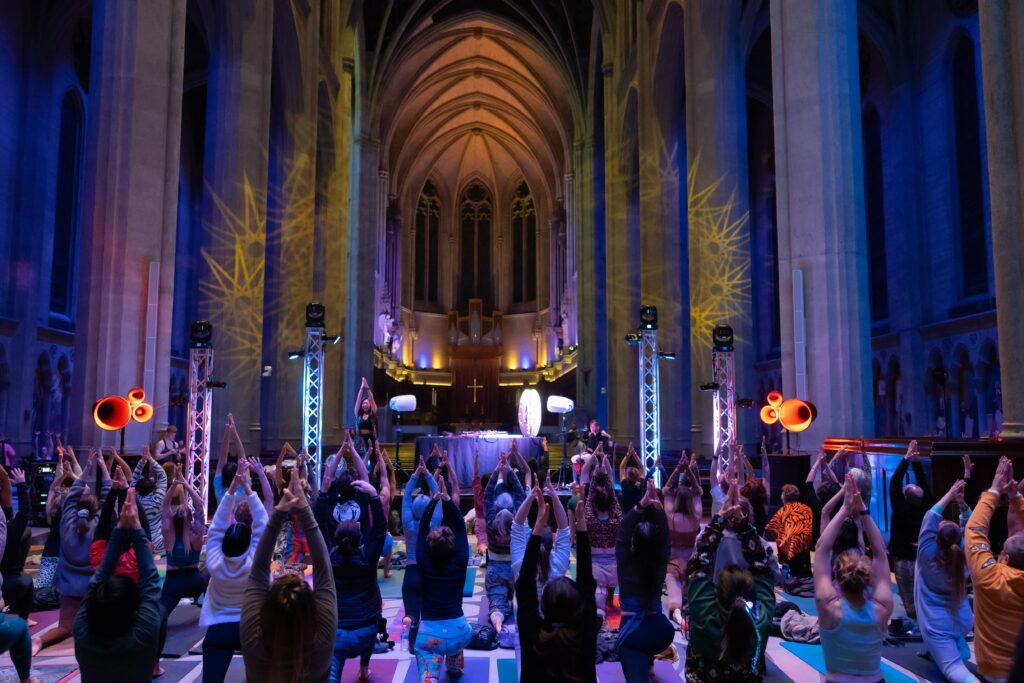
On social media, naysayers have trolled Daybreaker’s account. “We have been called a cult,” Agrawal admits, shrugging her shoulders. “I’d love to be a part of this joyful, sober cult. Here’s the big secret: every single person wants to be invited into an experience where they get to come out of their shell. It’s amazing how quickly we can thaw out of this too-cool-for-school or anxious or shy energy through the invitation. That’s why we have it be a sober experience. The closing ceremony is to ground that energy that feels so human and so deep.”
Daybreaker’s following caught the attention of media guru almighty Oprah Winfrey, who booked them for the “Oprah’s 2020 Vision: Your Life in Focus” tour. “They took 35 of us on a nine-stadium tour with Oprah,” Agrawal says with pride. “She wanted a community event experience to open up and create community before she came on. Daybreaker opened every stop of her tour. That was the biggest thing we’ve ever done.”
As big-time as the Oprah gig was, Agrawal is on a larger mission with what started as Daybreaker. In 2018 she wrote a best-selling book, Belong, about “finding your people” and creating genuine community. MTV called her “one of eight women who will change the world.” A few months ago, Agrawal launched the most ambitious project she’s ever taken on: Belong Center, Daybreaker’s nonprofit, with a mission to “end loneliness and empower belonging for all.”
“Belong Center came from seeing that our biggest pandemic right now in this country is loneliness. I want to recreate the YMCA or community center and make it cool, fun, joyful, and sematic. We are announcing a thousand block party challenge. We are going to reinvigorate the block party in America,” she says. Agrawal has stacked the Belong Center board with impressive names like Dr. Mark Hyman, author and global activist Lynne Twist, and philanthropist Kimbal Musk, Elon’s brother. “We just hired Becca Bernstein, an incredible woman who came from Sheryl Sandberg’s LeanIn.Org to be my chief community and operations officer.”
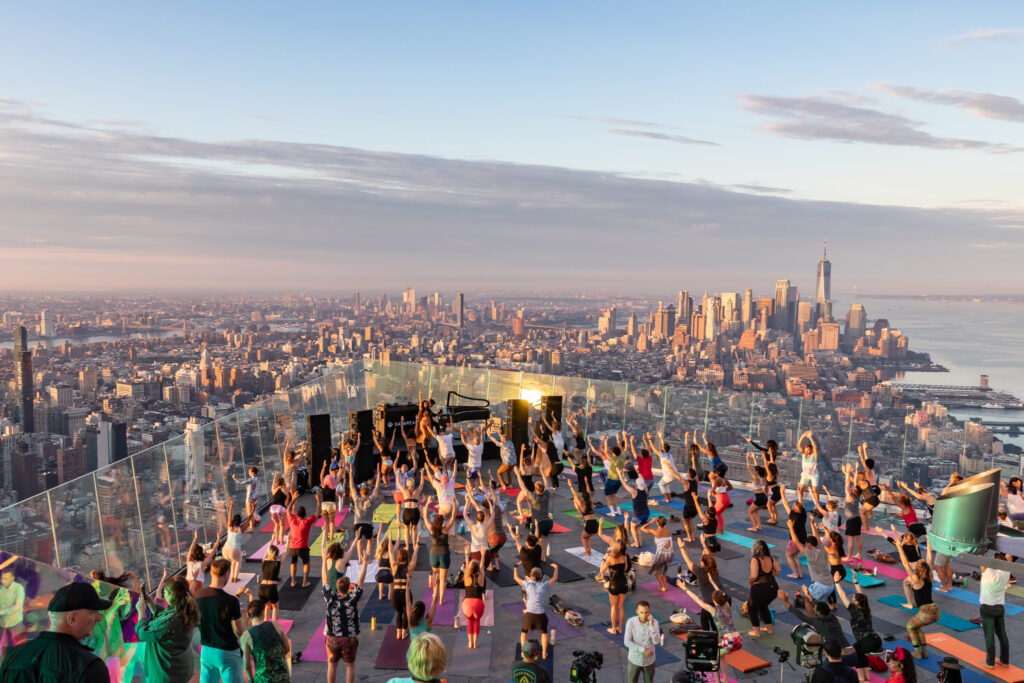
In addition to community-building block parties, Belong Center enticed the renowned architecture firm Bjarke Ingels Group, who designed the Zurich airport, to create special bright yellow Belong Benches, pro bono, that will pop up in public spaces across the nation. The benches are circular, so one doesn’t stare straight ahead, but rather at each other. “It’s an invitation to sit together and connect, meet a neighbor, meet a stranger, meet a lover,” Agrawal says. The ends of each bench will have a QR code to scan and get 10 questions to make a new friend or to fall in love, as well as an audio podcast and musical playlists. They already have more than 40, which have been sponsored.
The past year, in response to wars in Ukraine and Israel, Daybreaker dubbed their events the “Peace Tour.” Next up is the “Purple Tour”—symbolizing both political parties, red and blue, coming together. “We got our biggest contract in Daybreaker history to do a Get Out the Vote project,” Agrawal announces. “We’re going to every swing state during the elections to get young people out to vote and make civic engagement exciting and celebratory rather than an experience like going to the DMV. We’re going to bus people to the polls and throw dance parties around the elections. Red and blue coming together: one team, one dream.”
Agrawal is the ultimate dreamer, and she dreams big. As she excitedly discusses the myriads of projects up her sleeve, charisma radiates off her like sunbeams. It’s impossible not to get caught up in the enthusiasm and joy she has for making other people smile more often. The “Purple Tour” is keeping her busy until Election Day, staging over 100 events all over the country. She is jetting all over, throwing Daybreaker dance parties and getting people registered to vote. But Agrawal says her heart will always remain in New York, the city where she dreamed up Daybreaker on a Brooklyn curb late one night. “I’m a 20-year New Yorker,” Agrawal declares with her trademark beaming smile. “I’m a proud soldier for the city. When everyone left during Covid, I stayed and built an online social club. I feel very committed to the culture of the city. This city has given us everything.”
